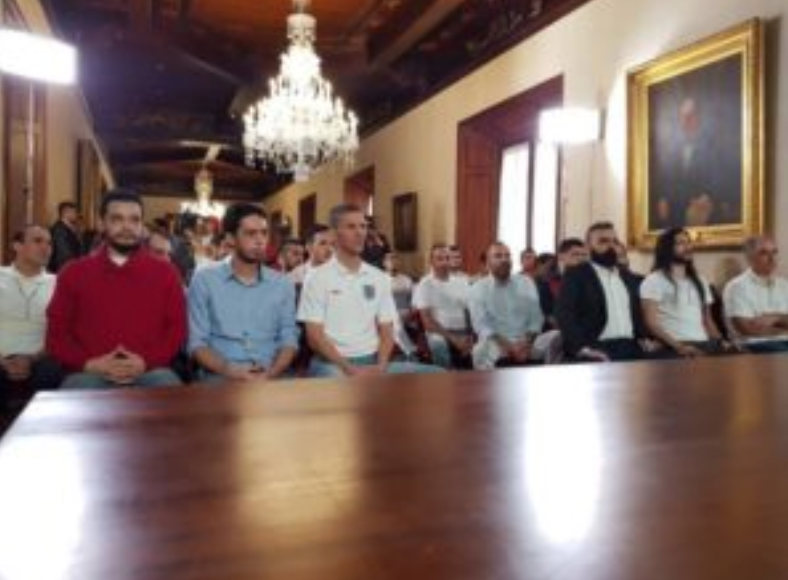Political prisoners receive lecture before being released.
On June 13 after the third round of releases of political prisoners by the government, Delcy Rodríguez (then president of the Constitutive Assembly, Venezuela’s Vice-president since June 14), announced that for now, this will be the final group to receive procedural benefits. She also said that, since December last year 200 prisoners have been released, 123 since June 1. Local human rights organization Foro Penal contends that of the 123 released in June, only 62 can be considered political prisoners. According to Foro Penal, there are still 280 political prisoners in different Venezuelan jails after latest releases.
The government is framing theses releases as a generous gesture of reconciliation. In the three most recent rounds of releases the procedure was almost identically staged. Prisoners were bused from their detention centers to the Casa Amarilla in downtown Caracas, a Nineteenth Century building housing the Venezuelan Foreign Ministry. There, before being granted different forms of procedural benefits, prisoners listen to government officials lecture them on the meaning of their release.
Then president of the National Constituent Assembly (ANC) Delcy Rodriguez explained to the most recent group that their release was “a message of union for Venezuelans…a message of reconciliation for everyone, so that Venezuela will never again walk the path of destabilizing violence with political aims.” Ombudsman and former human rights activist Alfredo Ruiz admonished them, saying their release was forgiveness from “the victims of political violence,” referring to those who had suffered because of opposition protests. The prisoners, and sometimes their lawyers, also had to sign documents written by the ANC expressing their commitment to “fight for peace and democracy in Venezuela.” They were then bused back to their detention centers to be released there.
The government message is clear: these prisoners were not being unfairly held on political motivated grounds, but because they had engaged in destabilizing political violence. Indeed, the government denies the term “political prisoners” and prefers to call them people “implicated in political violence,” their political violence. Accordingly, among those released are several pro-government activists arrested for acting against opposition protests in the past, and also several people with no explicit political militancy that have participated in protests for basic services, medicine or food. Persons from all of these groups are now being released because the government is trying, according to the Attorney General Tarek William Saab, to “create a space for dialogue, reconciliation and coexistence.”
The list of those to-be-released is first checked by the “Truth, Justice, Peace, and Public Tranquility Commission,” which works in consultation with the pro-government “victims of political violence” groups. The most important of such groups, the “Committee of Victims of the Guarimba and Continuous Coup,” published a statement on June 2, announcing their support for the release measures because of the need for dialogue and reconciliation. But they also reminded the government that “it is not possible to reach a real and sustainable peace process without recognition and integral attention to the victims.”
Several government commentators have also supported the releases as a pragmatic way to get rid of a distraction and focus on winning the “economic war” the government claims is being waged by imperialist forces abroad and their local collaborators.
For example, the author of a piece in the pro-government portal Misión Verdad, starts by admitting to an almost “physical pain” at watching images of the “liberation of a handful of psychopaths who should remain in prison for ever.” But he goes on to explain that things are not so simple in the struggle against “the enemy,” and urges the reader to understand that president Maduro is forced to make concessions in order to win the longer war against this enemy. He explains, by way of example, that it is now very clear that opposition leader Julio Borges (who has championed international sanctions against government officials) is directly responsible for inflation, but that arresting Borges would not immediately lower food prices the next day and would instead have adverse political consequences.
Another opinion piece published by Misión Verdad, tagged under “The War in Venezuela”, explains the objectives of the prisoner’s release. The article says that even though it is true that those released have been “processed or sentenced” because of their participation in “violent networks of 2014 and 2017,” none of them belongs directly to the group of “assassins” that participated in those protests. And while Maduro has repeatedly told his followers that there can be no peace without justice, he has to handle the current crisis with pragmatism: “he has used both hands in the management of the internal conflict promoted by anti-chavismo. With one hand he has deployed the State’s security apparatus to contain or eradicate latent threats, but he has also offered his other hand for dialogue, reconciliation and reparation.”
The article goes to great length to explain that they are not simply being freed. Most of these activists are receiving varying forms of “procedural benefits,” from house arrest to conditional release, but that their judicial process continues. This is a point government officials have stressed. Regarding the first round of releases, President Maduro said: “If the resort again to violence, they will go back to jail. Justice will be applied to them.”



